Social Work with Adults: Legislation, Assessment, and Safeguarding
VerifiedAdded on 2022/11/30
|10
|3103
|107
Report
AI Summary
This report delves into the multifaceted realm of social work with adults, using a case study of a 70-year-old woman with Alzheimer's to illustrate key concepts. It examines relevant legislation such as the Care Act 2014, the Mental Capacity Act 2005, and the Safeguarding Vulnerable Groups Act 2006, emphasizing their impact on service users and carers. The report explores the principles of holistic assessment, highlighting its role in promoting the rights of adults and addressing their physical, emotional, spiritual, and mental health needs. It also discusses safeguarding procedures, risk assessment, and anti-oppressive practices within the context of social work. The report underscores the importance of legal frameworks in guiding social work practice, ensuring fair treatment, and protecting the rights of vulnerable individuals, ultimately advocating for person-centered care and the promotion of equality and diversity within health and social care settings.
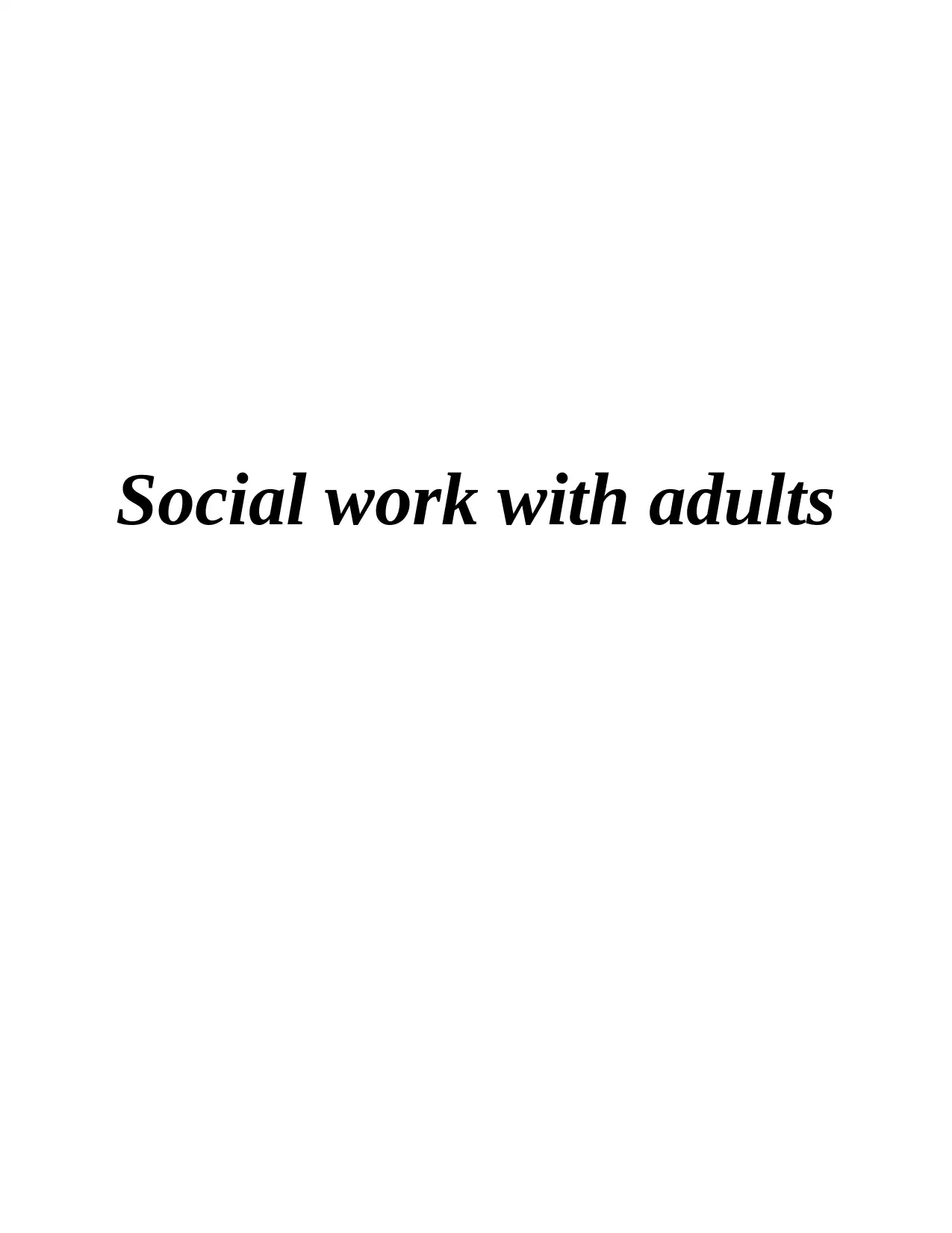
Social work with adults
Paraphrase This Document
Need a fresh take? Get an instant paraphrase of this document with our AI Paraphraser
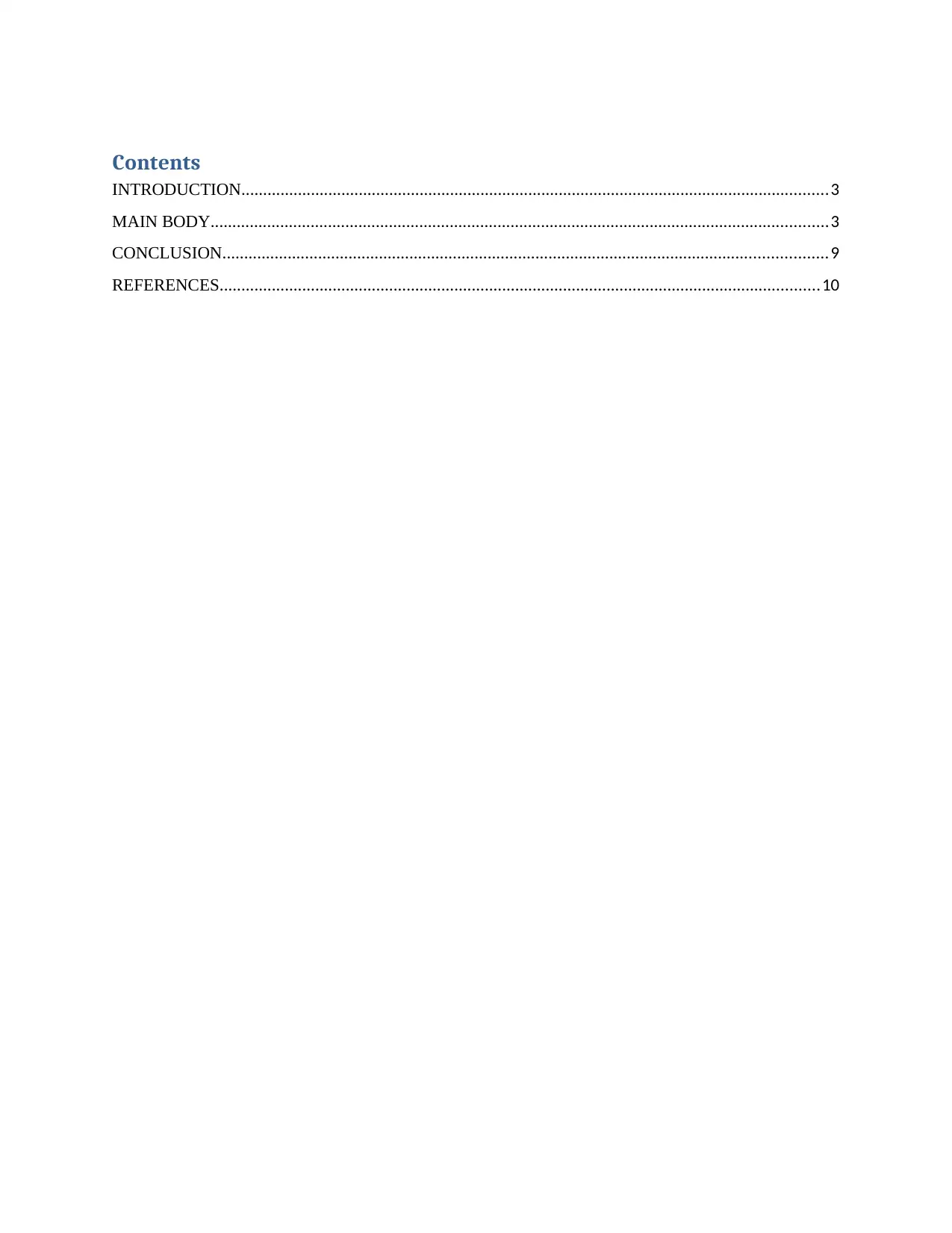
Contents
INTRODUCTION.......................................................................................................................................3
MAIN BODY..............................................................................................................................................3
CONCLUSION...........................................................................................................................................9
REFERENCES..........................................................................................................................................10
INTRODUCTION.......................................................................................................................................3
MAIN BODY..............................................................................................................................................3
CONCLUSION...........................................................................................................................................9
REFERENCES..........................................................................................................................................10
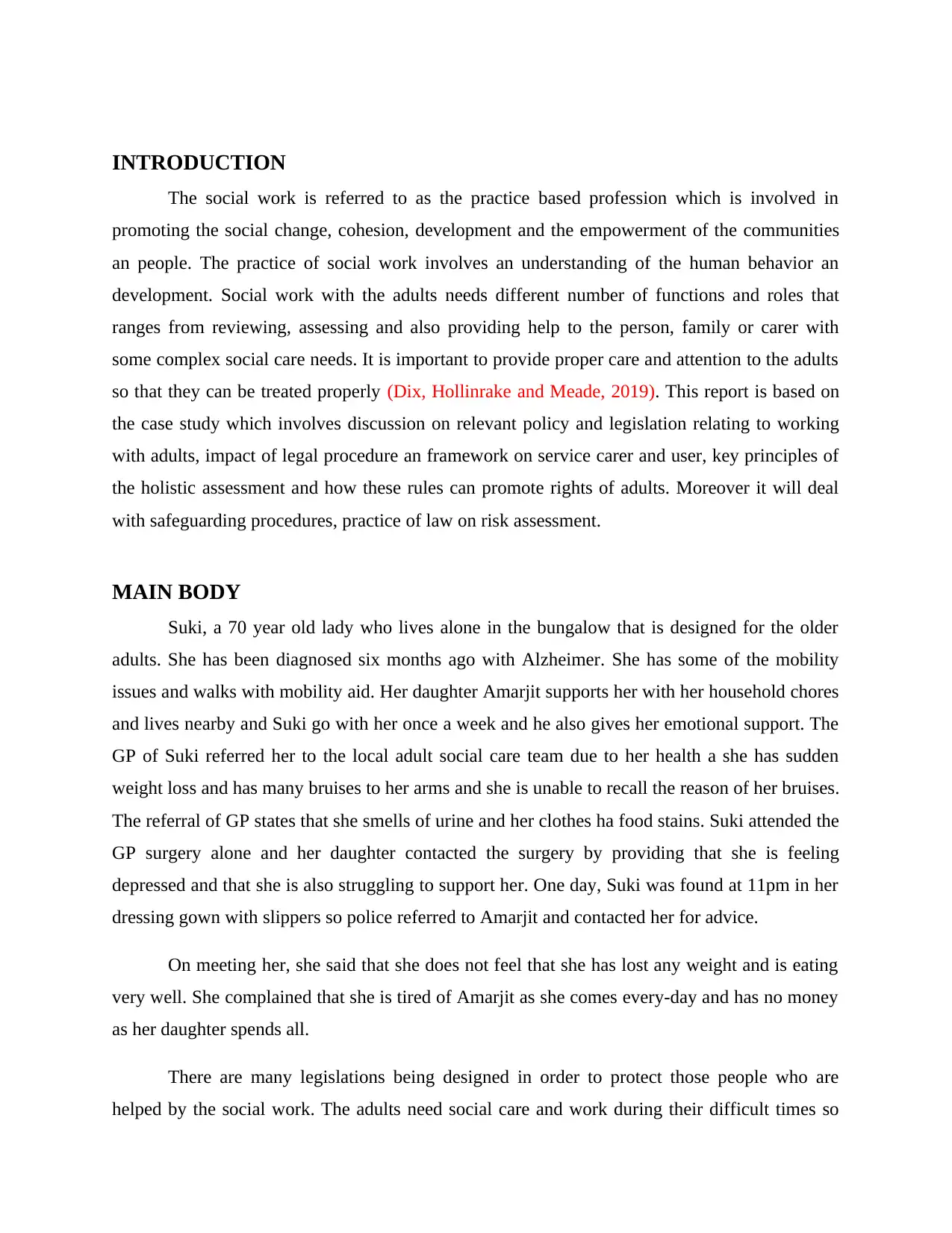
INTRODUCTION
The social work is referred to as the practice based profession which is involved in
promoting the social change, cohesion, development and the empowerment of the communities
an people. The practice of social work involves an understanding of the human behavior an
development. Social work with the adults needs different number of functions and roles that
ranges from reviewing, assessing and also providing help to the person, family or carer with
some complex social care needs. It is important to provide proper care and attention to the adults
so that they can be treated properly (Dix, Hollinrake and Meade, 2019). This report is based on
the case study which involves discussion on relevant policy and legislation relating to working
with adults, impact of legal procedure an framework on service carer and user, key principles of
the holistic assessment and how these rules can promote rights of adults. Moreover it will deal
with safeguarding procedures, practice of law on risk assessment.
MAIN BODY
Suki, a 70 year old lady who lives alone in the bungalow that is designed for the older
adults. She has been diagnosed six months ago with Alzheimer. She has some of the mobility
issues and walks with mobility aid. Her daughter Amarjit supports her with her household chores
and lives nearby and Suki go with her once a week and he also gives her emotional support. The
GP of Suki referred her to the local adult social care team due to her health a she has sudden
weight loss and has many bruises to her arms and she is unable to recall the reason of her bruises.
The referral of GP states that she smells of urine and her clothes ha food stains. Suki attended the
GP surgery alone and her daughter contacted the surgery by providing that she is feeling
depressed and that she is also struggling to support her. One day, Suki was found at 11pm in her
dressing gown with slippers so police referred to Amarjit and contacted her for advice.
On meeting her, she said that she does not feel that she has lost any weight and is eating
very well. She complained that she is tired of Amarjit as she comes every-day and has no money
as her daughter spends all.
There are many legislations being designed in order to protect those people who are
helped by the social work. The adults need social care and work during their difficult times so
The social work is referred to as the practice based profession which is involved in
promoting the social change, cohesion, development and the empowerment of the communities
an people. The practice of social work involves an understanding of the human behavior an
development. Social work with the adults needs different number of functions and roles that
ranges from reviewing, assessing and also providing help to the person, family or carer with
some complex social care needs. It is important to provide proper care and attention to the adults
so that they can be treated properly (Dix, Hollinrake and Meade, 2019). This report is based on
the case study which involves discussion on relevant policy and legislation relating to working
with adults, impact of legal procedure an framework on service carer and user, key principles of
the holistic assessment and how these rules can promote rights of adults. Moreover it will deal
with safeguarding procedures, practice of law on risk assessment.
MAIN BODY
Suki, a 70 year old lady who lives alone in the bungalow that is designed for the older
adults. She has been diagnosed six months ago with Alzheimer. She has some of the mobility
issues and walks with mobility aid. Her daughter Amarjit supports her with her household chores
and lives nearby and Suki go with her once a week and he also gives her emotional support. The
GP of Suki referred her to the local adult social care team due to her health a she has sudden
weight loss and has many bruises to her arms and she is unable to recall the reason of her bruises.
The referral of GP states that she smells of urine and her clothes ha food stains. Suki attended the
GP surgery alone and her daughter contacted the surgery by providing that she is feeling
depressed and that she is also struggling to support her. One day, Suki was found at 11pm in her
dressing gown with slippers so police referred to Amarjit and contacted her for advice.
On meeting her, she said that she does not feel that she has lost any weight and is eating
very well. She complained that she is tired of Amarjit as she comes every-day and has no money
as her daughter spends all.
There are many legislations being designed in order to protect those people who are
helped by the social work. The adults need social care and work during their difficult times so
⊘ This is a preview!⊘
Do you want full access?
Subscribe today to unlock all pages.

Trusted by 1+ million students worldwide
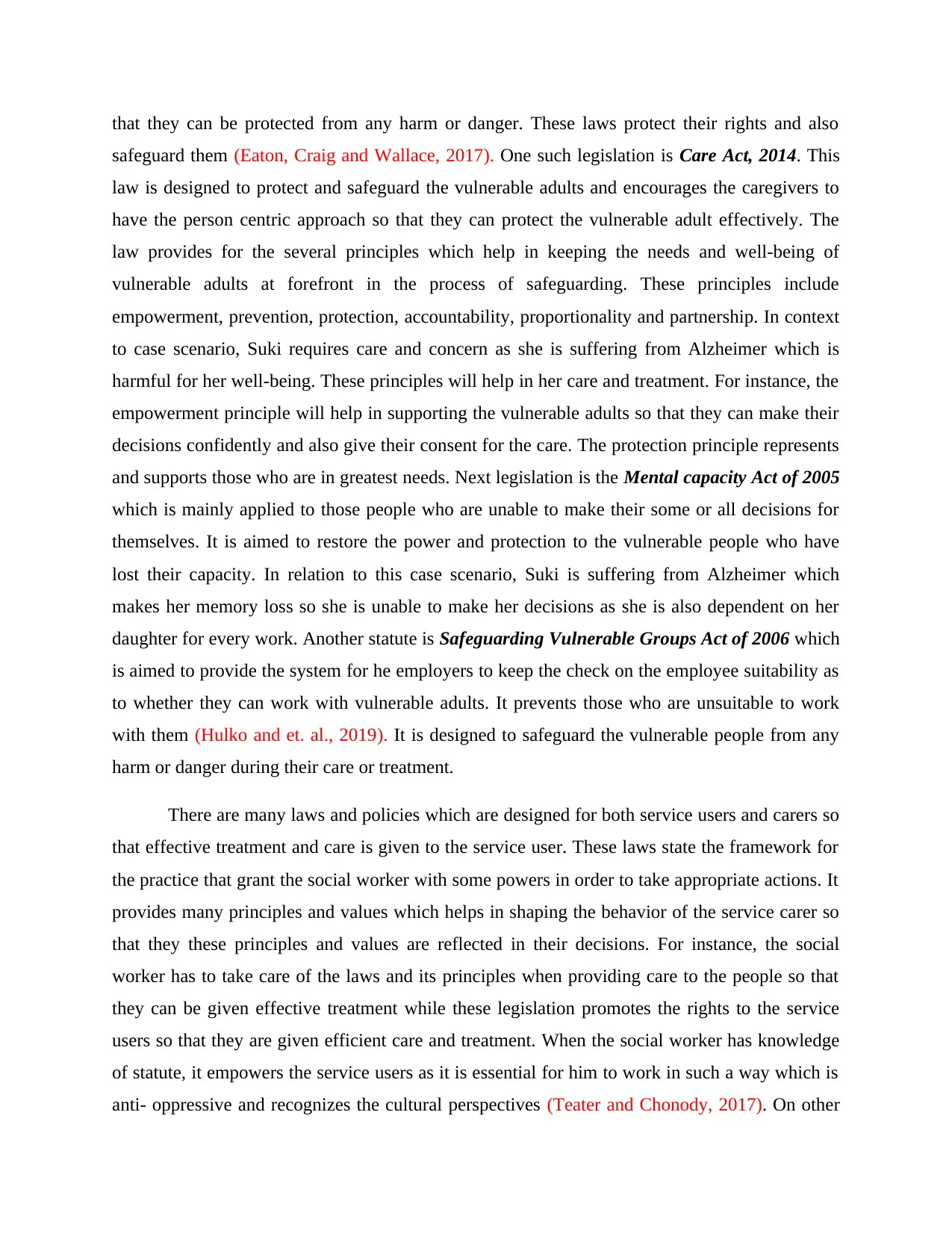
that they can be protected from any harm or danger. These laws protect their rights and also
safeguard them (Eaton, Craig and Wallace, 2017). One such legislation is Care Act, 2014. This
law is designed to protect and safeguard the vulnerable adults and encourages the caregivers to
have the person centric approach so that they can protect the vulnerable adult effectively. The
law provides for the several principles which help in keeping the needs and well-being of
vulnerable adults at forefront in the process of safeguarding. These principles include
empowerment, prevention, protection, accountability, proportionality and partnership. In context
to case scenario, Suki requires care and concern as she is suffering from Alzheimer which is
harmful for her well-being. These principles will help in her care and treatment. For instance, the
empowerment principle will help in supporting the vulnerable adults so that they can make their
decisions confidently and also give their consent for the care. The protection principle represents
and supports those who are in greatest needs. Next legislation is the Mental capacity Act of 2005
which is mainly applied to those people who are unable to make their some or all decisions for
themselves. It is aimed to restore the power and protection to the vulnerable people who have
lost their capacity. In relation to this case scenario, Suki is suffering from Alzheimer which
makes her memory loss so she is unable to make her decisions as she is also dependent on her
daughter for every work. Another statute is Safeguarding Vulnerable Groups Act of 2006 which
is aimed to provide the system for he employers to keep the check on the employee suitability as
to whether they can work with vulnerable adults. It prevents those who are unsuitable to work
with them (Hulko and et. al., 2019). It is designed to safeguard the vulnerable people from any
harm or danger during their care or treatment.
There are many laws and policies which are designed for both service users and carers so
that effective treatment and care is given to the service user. These laws state the framework for
the practice that grant the social worker with some powers in order to take appropriate actions. It
provides many principles and values which helps in shaping the behavior of the service carer so
that they these principles and values are reflected in their decisions. For instance, the social
worker has to take care of the laws and its principles when providing care to the people so that
they can be given effective treatment while these legislation promotes the rights to the service
users so that they are given efficient care and treatment. When the social worker has knowledge
of statute, it empowers the service users as it is essential for him to work in such a way which is
anti- oppressive and recognizes the cultural perspectives (Teater and Chonody, 2017). On other
safeguard them (Eaton, Craig and Wallace, 2017). One such legislation is Care Act, 2014. This
law is designed to protect and safeguard the vulnerable adults and encourages the caregivers to
have the person centric approach so that they can protect the vulnerable adult effectively. The
law provides for the several principles which help in keeping the needs and well-being of
vulnerable adults at forefront in the process of safeguarding. These principles include
empowerment, prevention, protection, accountability, proportionality and partnership. In context
to case scenario, Suki requires care and concern as she is suffering from Alzheimer which is
harmful for her well-being. These principles will help in her care and treatment. For instance, the
empowerment principle will help in supporting the vulnerable adults so that they can make their
decisions confidently and also give their consent for the care. The protection principle represents
and supports those who are in greatest needs. Next legislation is the Mental capacity Act of 2005
which is mainly applied to those people who are unable to make their some or all decisions for
themselves. It is aimed to restore the power and protection to the vulnerable people who have
lost their capacity. In relation to this case scenario, Suki is suffering from Alzheimer which
makes her memory loss so she is unable to make her decisions as she is also dependent on her
daughter for every work. Another statute is Safeguarding Vulnerable Groups Act of 2006 which
is aimed to provide the system for he employers to keep the check on the employee suitability as
to whether they can work with vulnerable adults. It prevents those who are unsuitable to work
with them (Hulko and et. al., 2019). It is designed to safeguard the vulnerable people from any
harm or danger during their care or treatment.
There are many laws and policies which are designed for both service users and carers so
that effective treatment and care is given to the service user. These laws state the framework for
the practice that grant the social worker with some powers in order to take appropriate actions. It
provides many principles and values which helps in shaping the behavior of the service carer so
that they these principles and values are reflected in their decisions. For instance, the social
worker has to take care of the laws and its principles when providing care to the people so that
they can be given effective treatment while these legislation promotes the rights to the service
users so that they are given efficient care and treatment. When the social worker has knowledge
of statute, it empowers the service users as it is essential for him to work in such a way which is
anti- oppressive and recognizes the cultural perspectives (Teater and Chonody, 2017). On other
Paraphrase This Document
Need a fresh take? Get an instant paraphrase of this document with our AI Paraphraser
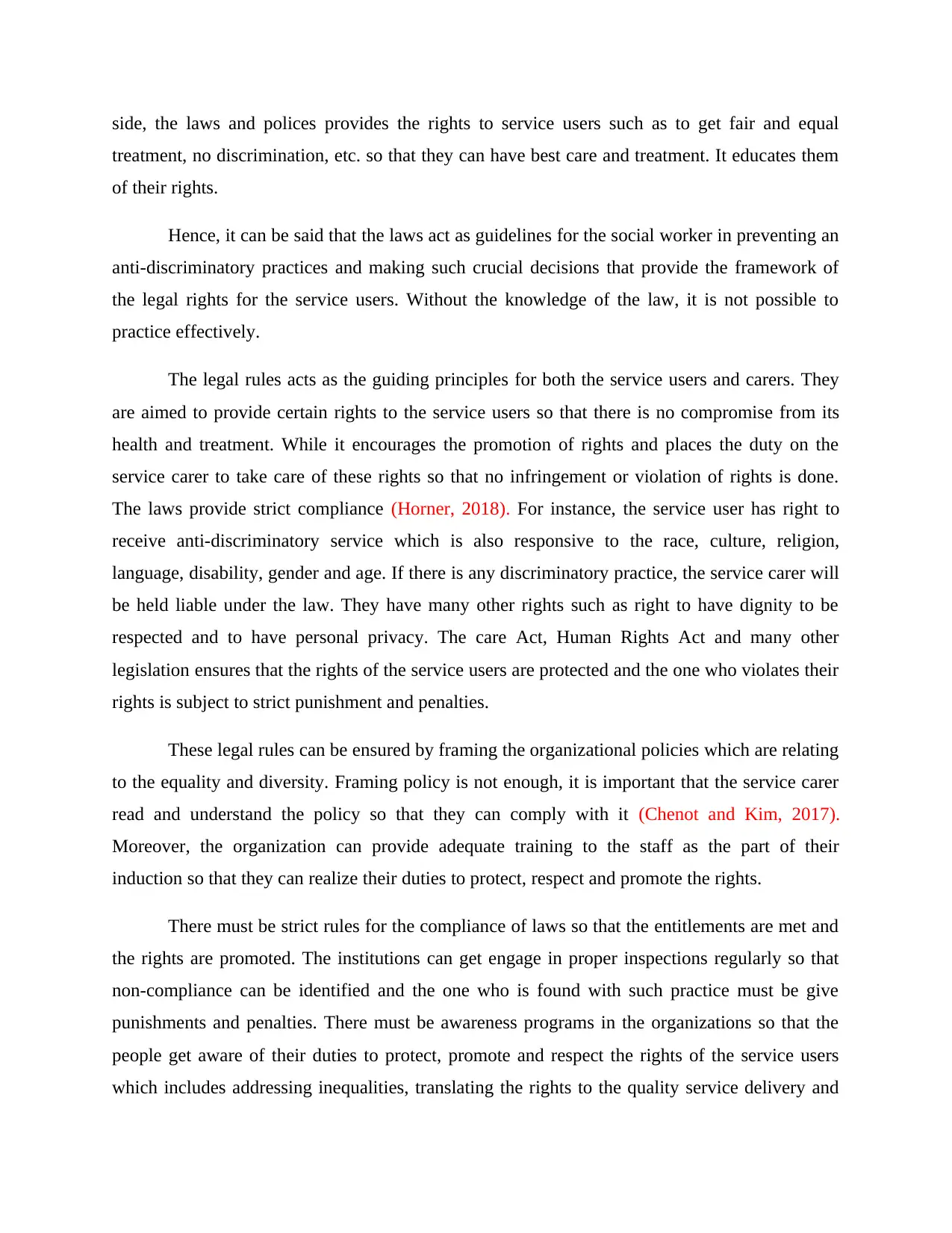
side, the laws and polices provides the rights to service users such as to get fair and equal
treatment, no discrimination, etc. so that they can have best care and treatment. It educates them
of their rights.
Hence, it can be said that the laws act as guidelines for the social worker in preventing an
anti-discriminatory practices and making such crucial decisions that provide the framework of
the legal rights for the service users. Without the knowledge of the law, it is not possible to
practice effectively.
The legal rules acts as the guiding principles for both the service users and carers. They
are aimed to provide certain rights to the service users so that there is no compromise from its
health and treatment. While it encourages the promotion of rights and places the duty on the
service carer to take care of these rights so that no infringement or violation of rights is done.
The laws provide strict compliance (Horner, 2018). For instance, the service user has right to
receive anti-discriminatory service which is also responsive to the race, culture, religion,
language, disability, gender and age. If there is any discriminatory practice, the service carer will
be held liable under the law. They have many other rights such as right to have dignity to be
respected and to have personal privacy. The care Act, Human Rights Act and many other
legislation ensures that the rights of the service users are protected and the one who violates their
rights is subject to strict punishment and penalties.
These legal rules can be ensured by framing the organizational policies which are relating
to the equality and diversity. Framing policy is not enough, it is important that the service carer
read and understand the policy so that they can comply with it (Chenot and Kim, 2017).
Moreover, the organization can provide adequate training to the staff as the part of their
induction so that they can realize their duties to protect, respect and promote the rights.
There must be strict rules for the compliance of laws so that the entitlements are met and
the rights are promoted. The institutions can get engage in proper inspections regularly so that
non-compliance can be identified and the one who is found with such practice must be give
punishments and penalties. There must be awareness programs in the organizations so that the
people get aware of their duties to protect, promote and respect the rights of the service users
which includes addressing inequalities, translating the rights to the quality service delivery and
treatment, no discrimination, etc. so that they can have best care and treatment. It educates them
of their rights.
Hence, it can be said that the laws act as guidelines for the social worker in preventing an
anti-discriminatory practices and making such crucial decisions that provide the framework of
the legal rights for the service users. Without the knowledge of the law, it is not possible to
practice effectively.
The legal rules acts as the guiding principles for both the service users and carers. They
are aimed to provide certain rights to the service users so that there is no compromise from its
health and treatment. While it encourages the promotion of rights and places the duty on the
service carer to take care of these rights so that no infringement or violation of rights is done.
The laws provide strict compliance (Horner, 2018). For instance, the service user has right to
receive anti-discriminatory service which is also responsive to the race, culture, religion,
language, disability, gender and age. If there is any discriminatory practice, the service carer will
be held liable under the law. They have many other rights such as right to have dignity to be
respected and to have personal privacy. The care Act, Human Rights Act and many other
legislation ensures that the rights of the service users are protected and the one who violates their
rights is subject to strict punishment and penalties.
These legal rules can be ensured by framing the organizational policies which are relating
to the equality and diversity. Framing policy is not enough, it is important that the service carer
read and understand the policy so that they can comply with it (Chenot and Kim, 2017).
Moreover, the organization can provide adequate training to the staff as the part of their
induction so that they can realize their duties to protect, respect and promote the rights.
There must be strict rules for the compliance of laws so that the entitlements are met and
the rights are promoted. The institutions can get engage in proper inspections regularly so that
non-compliance can be identified and the one who is found with such practice must be give
punishments and penalties. There must be awareness programs in the organizations so that the
people get aware of their duties to protect, promote and respect the rights of the service users
which includes addressing inequalities, translating the rights to the quality service delivery and
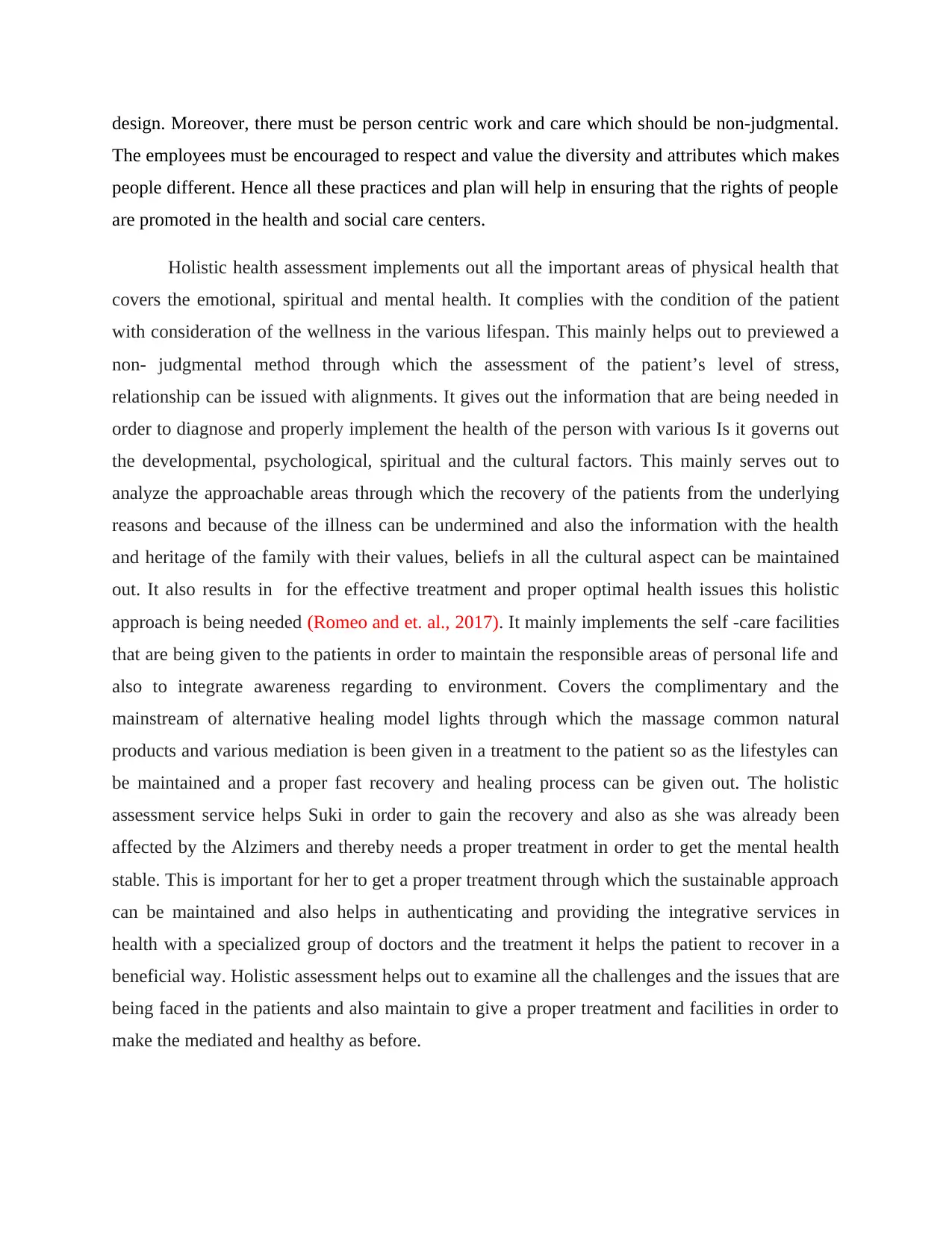
design. Moreover, there must be person centric work and care which should be non-judgmental.
The employees must be encouraged to respect and value the diversity and attributes which makes
people different. Hence all these practices and plan will help in ensuring that the rights of people
are promoted in the health and social care centers.
Holistic health assessment implements out all the important areas of physical health that
covers the emotional, spiritual and mental health. It complies with the condition of the patient
with consideration of the wellness in the various lifespan. This mainly helps out to previewed a
non- judgmental method through which the assessment of the patient’s level of stress,
relationship can be issued with alignments. It gives out the information that are being needed in
order to diagnose and properly implement the health of the person with various Is it governs out
the developmental, psychological, spiritual and the cultural factors. This mainly serves out to
analyze the approachable areas through which the recovery of the patients from the underlying
reasons and because of the illness can be undermined and also the information with the health
and heritage of the family with their values, beliefs in all the cultural aspect can be maintained
out. It also results in for the effective treatment and proper optimal health issues this holistic
approach is being needed (Romeo and et. al., 2017). It mainly implements the self -care facilities
that are being given to the patients in order to maintain the responsible areas of personal life and
also to integrate awareness regarding to environment. Covers the complimentary and the
mainstream of alternative healing model lights through which the massage common natural
products and various mediation is been given in a treatment to the patient so as the lifestyles can
be maintained and a proper fast recovery and healing process can be given out. The holistic
assessment service helps Suki in order to gain the recovery and also as she was already been
affected by the Alzimers and thereby needs a proper treatment in order to get the mental health
stable. This is important for her to get a proper treatment through which the sustainable approach
can be maintained and also helps in authenticating and providing the integrative services in
health with a specialized group of doctors and the treatment it helps the patient to recover in a
beneficial way. Holistic assessment helps out to examine all the challenges and the issues that are
being faced in the patients and also maintain to give a proper treatment and facilities in order to
make the mediated and healthy as before.
The employees must be encouraged to respect and value the diversity and attributes which makes
people different. Hence all these practices and plan will help in ensuring that the rights of people
are promoted in the health and social care centers.
Holistic health assessment implements out all the important areas of physical health that
covers the emotional, spiritual and mental health. It complies with the condition of the patient
with consideration of the wellness in the various lifespan. This mainly helps out to previewed a
non- judgmental method through which the assessment of the patient’s level of stress,
relationship can be issued with alignments. It gives out the information that are being needed in
order to diagnose and properly implement the health of the person with various Is it governs out
the developmental, psychological, spiritual and the cultural factors. This mainly serves out to
analyze the approachable areas through which the recovery of the patients from the underlying
reasons and because of the illness can be undermined and also the information with the health
and heritage of the family with their values, beliefs in all the cultural aspect can be maintained
out. It also results in for the effective treatment and proper optimal health issues this holistic
approach is being needed (Romeo and et. al., 2017). It mainly implements the self -care facilities
that are being given to the patients in order to maintain the responsible areas of personal life and
also to integrate awareness regarding to environment. Covers the complimentary and the
mainstream of alternative healing model lights through which the massage common natural
products and various mediation is been given in a treatment to the patient so as the lifestyles can
be maintained and a proper fast recovery and healing process can be given out. The holistic
assessment service helps Suki in order to gain the recovery and also as she was already been
affected by the Alzimers and thereby needs a proper treatment in order to get the mental health
stable. This is important for her to get a proper treatment through which the sustainable approach
can be maintained and also helps in authenticating and providing the integrative services in
health with a specialized group of doctors and the treatment it helps the patient to recover in a
beneficial way. Holistic assessment helps out to examine all the challenges and the issues that are
being faced in the patients and also maintain to give a proper treatment and facilities in order to
make the mediated and healthy as before.
⊘ This is a preview!⊘
Do you want full access?
Subscribe today to unlock all pages.

Trusted by 1+ million students worldwide
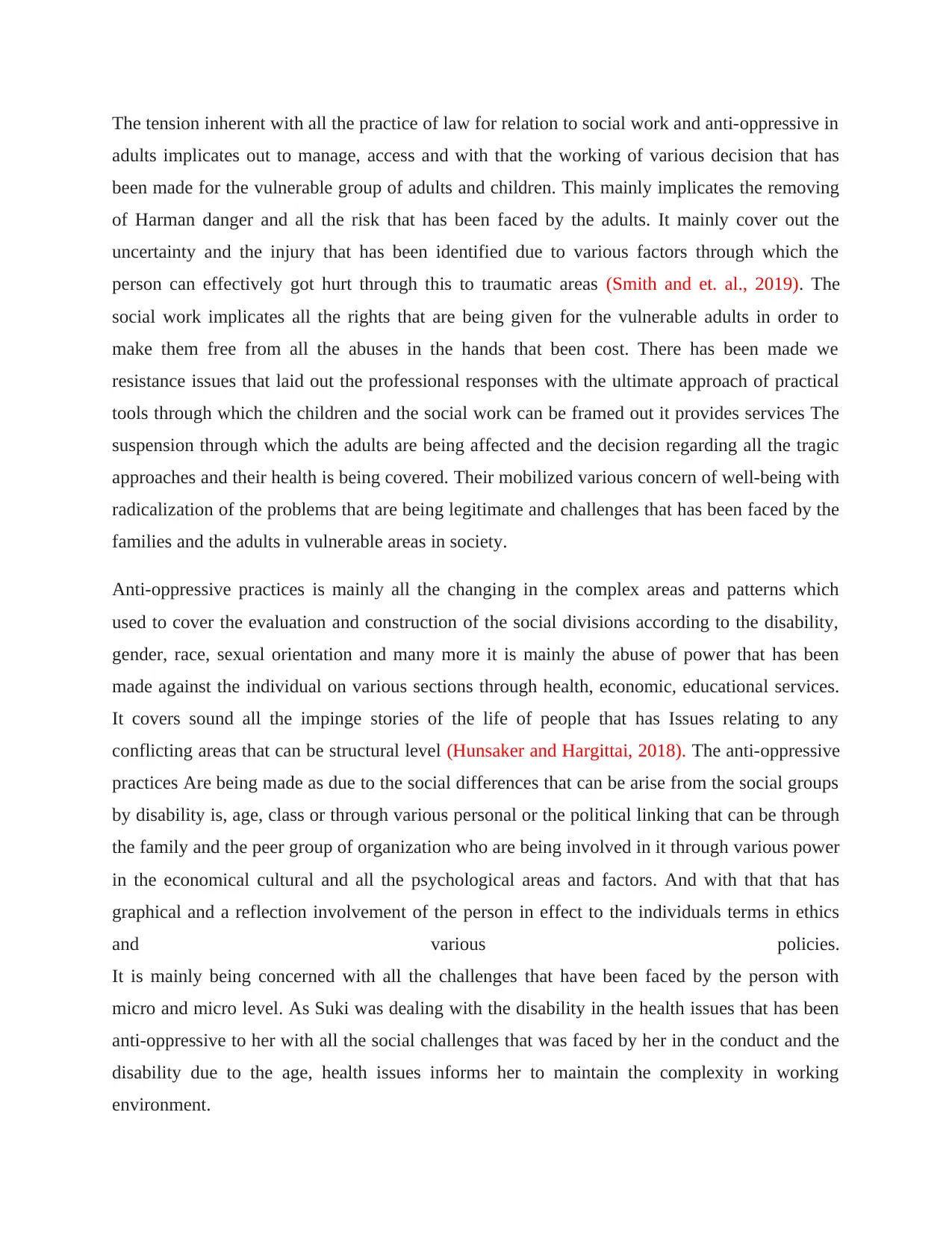
The tension inherent with all the practice of law for relation to social work and anti-oppressive in
adults implicates out to manage, access and with that the working of various decision that has
been made for the vulnerable group of adults and children. This mainly implicates the removing
of Harman danger and all the risk that has been faced by the adults. It mainly cover out the
uncertainty and the injury that has been identified due to various factors through which the
person can effectively got hurt through this to traumatic areas (Smith and et. al., 2019). The
social work implicates all the rights that are being given for the vulnerable adults in order to
make them free from all the abuses in the hands that been cost. There has been made we
resistance issues that laid out the professional responses with the ultimate approach of practical
tools through which the children and the social work can be framed out it provides services The
suspension through which the adults are being affected and the decision regarding all the tragic
approaches and their health is being covered. Their mobilized various concern of well-being with
radicalization of the problems that are being legitimate and challenges that has been faced by the
families and the adults in vulnerable areas in society.
Anti-oppressive practices is mainly all the changing in the complex areas and patterns which
used to cover the evaluation and construction of the social divisions according to the disability,
gender, race, sexual orientation and many more it is mainly the abuse of power that has been
made against the individual on various sections through health, economic, educational services.
It covers sound all the impinge stories of the life of people that has Issues relating to any
conflicting areas that can be structural level (Hunsaker and Hargittai, 2018). The anti-oppressive
practices Are being made as due to the social differences that can be arise from the social groups
by disability is, age, class or through various personal or the political linking that can be through
the family and the peer group of organization who are being involved in it through various power
in the economical cultural and all the psychological areas and factors. And with that that has
graphical and a reflection involvement of the person in effect to the individuals terms in ethics
and various policies.
It is mainly being concerned with all the challenges that have been faced by the person with
micro and micro level. As Suki was dealing with the disability in the health issues that has been
anti-oppressive to her with all the social challenges that was faced by her in the conduct and the
disability due to the age, health issues informs her to maintain the complexity in working
environment.
adults implicates out to manage, access and with that the working of various decision that has
been made for the vulnerable group of adults and children. This mainly implicates the removing
of Harman danger and all the risk that has been faced by the adults. It mainly cover out the
uncertainty and the injury that has been identified due to various factors through which the
person can effectively got hurt through this to traumatic areas (Smith and et. al., 2019). The
social work implicates all the rights that are being given for the vulnerable adults in order to
make them free from all the abuses in the hands that been cost. There has been made we
resistance issues that laid out the professional responses with the ultimate approach of practical
tools through which the children and the social work can be framed out it provides services The
suspension through which the adults are being affected and the decision regarding all the tragic
approaches and their health is being covered. Their mobilized various concern of well-being with
radicalization of the problems that are being legitimate and challenges that has been faced by the
families and the adults in vulnerable areas in society.
Anti-oppressive practices is mainly all the changing in the complex areas and patterns which
used to cover the evaluation and construction of the social divisions according to the disability,
gender, race, sexual orientation and many more it is mainly the abuse of power that has been
made against the individual on various sections through health, economic, educational services.
It covers sound all the impinge stories of the life of people that has Issues relating to any
conflicting areas that can be structural level (Hunsaker and Hargittai, 2018). The anti-oppressive
practices Are being made as due to the social differences that can be arise from the social groups
by disability is, age, class or through various personal or the political linking that can be through
the family and the peer group of organization who are being involved in it through various power
in the economical cultural and all the psychological areas and factors. And with that that has
graphical and a reflection involvement of the person in effect to the individuals terms in ethics
and various policies.
It is mainly being concerned with all the challenges that have been faced by the person with
micro and micro level. As Suki was dealing with the disability in the health issues that has been
anti-oppressive to her with all the social challenges that was faced by her in the conduct and the
disability due to the age, health issues informs her to maintain the complexity in working
environment.
Paraphrase This Document
Need a fresh take? Get an instant paraphrase of this document with our AI Paraphraser
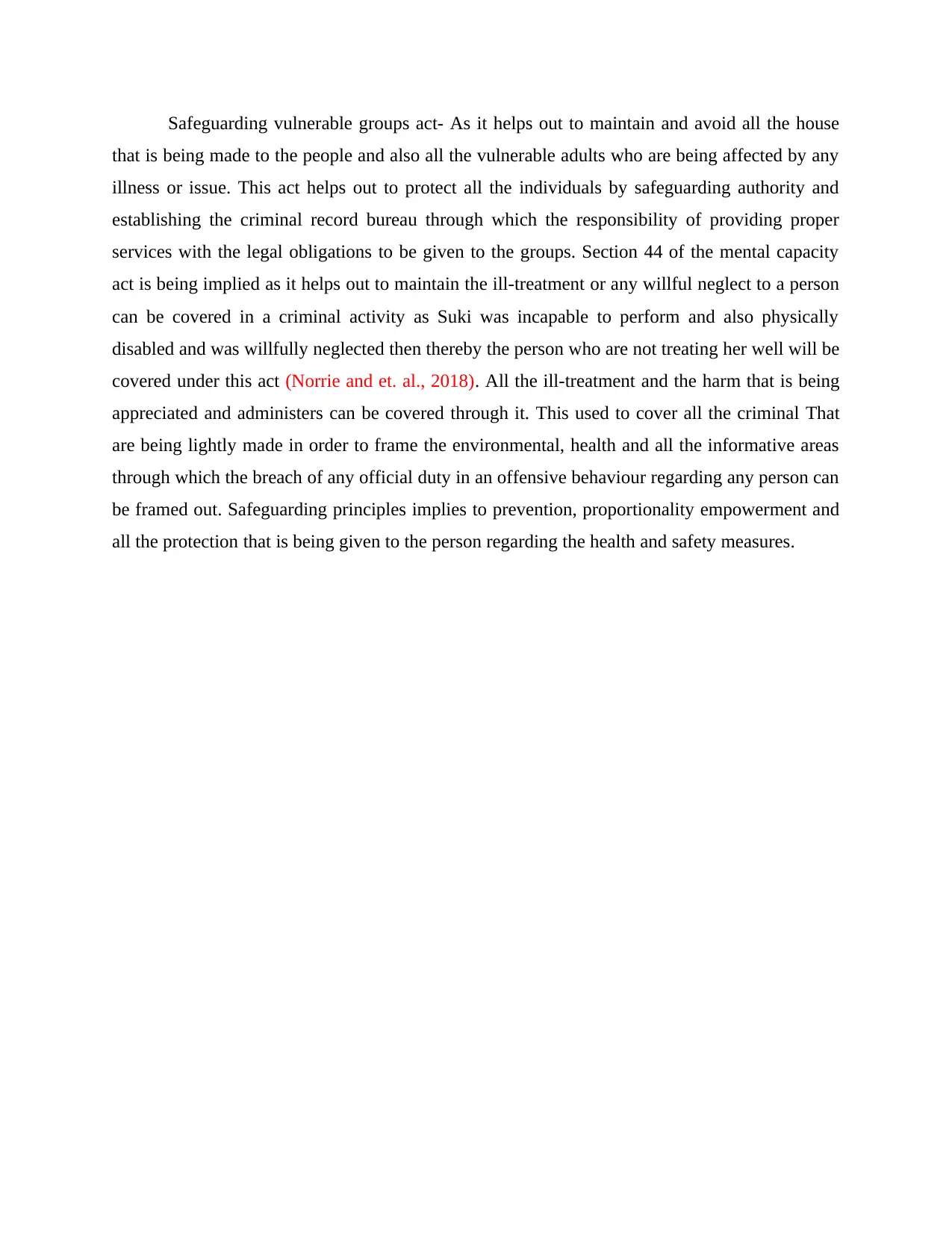
Safeguarding vulnerable groups act- As it helps out to maintain and avoid all the house
that is being made to the people and also all the vulnerable adults who are being affected by any
illness or issue. This act helps out to protect all the individuals by safeguarding authority and
establishing the criminal record bureau through which the responsibility of providing proper
services with the legal obligations to be given to the groups. Section 44 of the mental capacity
act is being implied as it helps out to maintain the ill-treatment or any willful neglect to a person
can be covered in a criminal activity as Suki was incapable to perform and also physically
disabled and was willfully neglected then thereby the person who are not treating her well will be
covered under this act (Norrie and et. al., 2018). All the ill-treatment and the harm that is being
appreciated and administers can be covered through it. This used to cover all the criminal That
are being lightly made in order to frame the environmental, health and all the informative areas
through which the breach of any official duty in an offensive behaviour regarding any person can
be framed out. Safeguarding principles implies to prevention, proportionality empowerment and
all the protection that is being given to the person regarding the health and safety measures.
that is being made to the people and also all the vulnerable adults who are being affected by any
illness or issue. This act helps out to protect all the individuals by safeguarding authority and
establishing the criminal record bureau through which the responsibility of providing proper
services with the legal obligations to be given to the groups. Section 44 of the mental capacity
act is being implied as it helps out to maintain the ill-treatment or any willful neglect to a person
can be covered in a criminal activity as Suki was incapable to perform and also physically
disabled and was willfully neglected then thereby the person who are not treating her well will be
covered under this act (Norrie and et. al., 2018). All the ill-treatment and the harm that is being
appreciated and administers can be covered through it. This used to cover all the criminal That
are being lightly made in order to frame the environmental, health and all the informative areas
through which the breach of any official duty in an offensive behaviour regarding any person can
be framed out. Safeguarding principles implies to prevention, proportionality empowerment and
all the protection that is being given to the person regarding the health and safety measures.
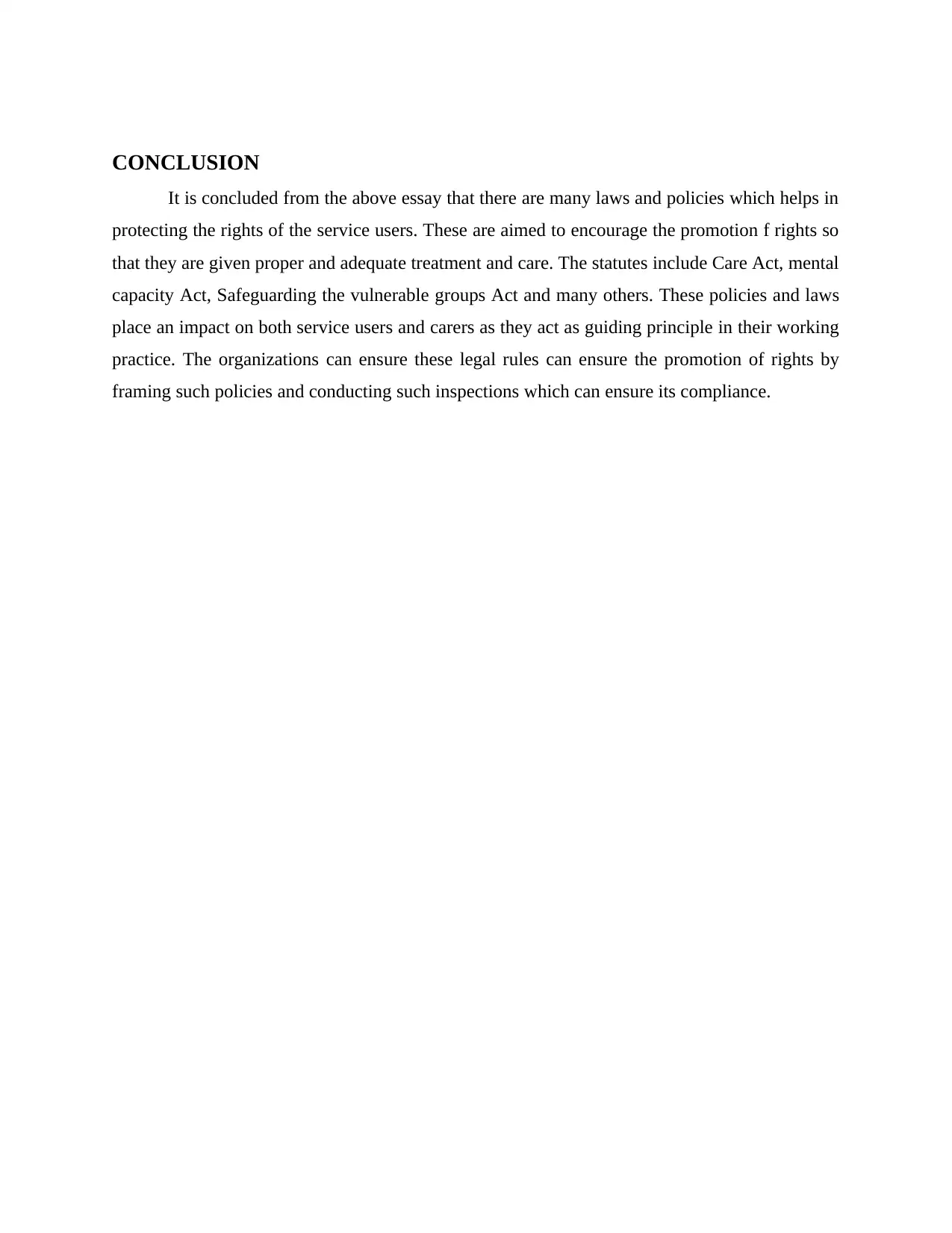
CONCLUSION
It is concluded from the above essay that there are many laws and policies which helps in
protecting the rights of the service users. These are aimed to encourage the promotion f rights so
that they are given proper and adequate treatment and care. The statutes include Care Act, mental
capacity Act, Safeguarding the vulnerable groups Act and many others. These policies and laws
place an impact on both service users and carers as they act as guiding principle in their working
practice. The organizations can ensure these legal rules can ensure the promotion of rights by
framing such policies and conducting such inspections which can ensure its compliance.
It is concluded from the above essay that there are many laws and policies which helps in
protecting the rights of the service users. These are aimed to encourage the promotion f rights so
that they are given proper and adequate treatment and care. The statutes include Care Act, mental
capacity Act, Safeguarding the vulnerable groups Act and many others. These policies and laws
place an impact on both service users and carers as they act as guiding principle in their working
practice. The organizations can ensure these legal rules can ensure the promotion of rights by
framing such policies and conducting such inspections which can ensure its compliance.
⊘ This is a preview!⊘
Do you want full access?
Subscribe today to unlock all pages.

Trusted by 1+ million students worldwide
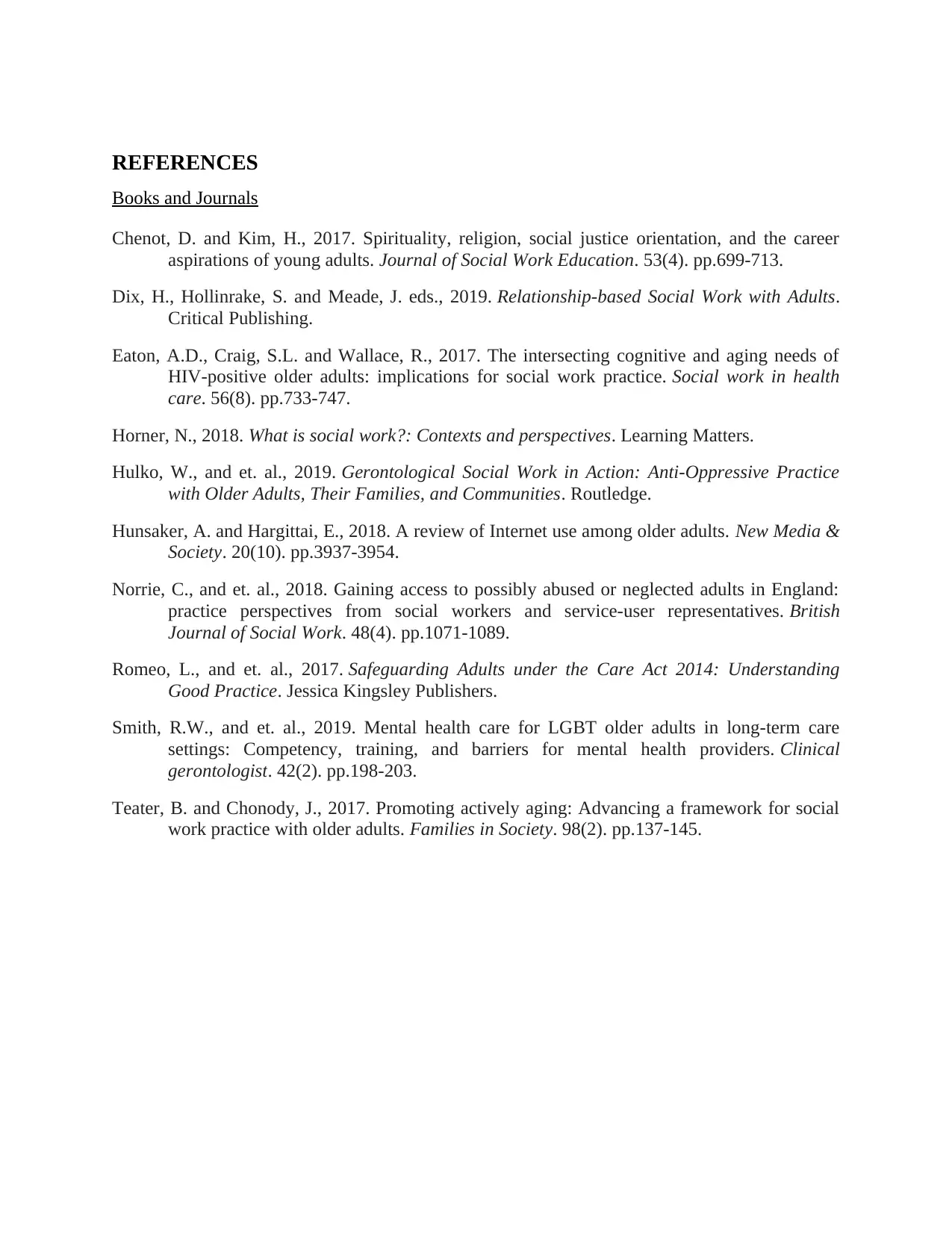
REFERENCES
Books and Journals
Chenot, D. and Kim, H., 2017. Spirituality, religion, social justice orientation, and the career
aspirations of young adults. Journal of Social Work Education. 53(4). pp.699-713.
Dix, H., Hollinrake, S. and Meade, J. eds., 2019. Relationship-based Social Work with Adults.
Critical Publishing.
Eaton, A.D., Craig, S.L. and Wallace, R., 2017. The intersecting cognitive and aging needs of
HIV-positive older adults: implications for social work practice. Social work in health
care. 56(8). pp.733-747.
Horner, N., 2018. What is social work?: Contexts and perspectives. Learning Matters.
Hulko, W., and et. al., 2019. Gerontological Social Work in Action: Anti-Oppressive Practice
with Older Adults, Their Families, and Communities. Routledge.
Hunsaker, A. and Hargittai, E., 2018. A review of Internet use among older adults. New Media &
Society. 20(10). pp.3937-3954.
Norrie, C., and et. al., 2018. Gaining access to possibly abused or neglected adults in England:
practice perspectives from social workers and service-user representatives. British
Journal of Social Work. 48(4). pp.1071-1089.
Romeo, L., and et. al., 2017. Safeguarding Adults under the Care Act 2014: Understanding
Good Practice. Jessica Kingsley Publishers.
Smith, R.W., and et. al., 2019. Mental health care for LGBT older adults in long-term care
settings: Competency, training, and barriers for mental health providers. Clinical
gerontologist. 42(2). pp.198-203.
Teater, B. and Chonody, J., 2017. Promoting actively aging: Advancing a framework for social
work practice with older adults. Families in Society. 98(2). pp.137-145.
Books and Journals
Chenot, D. and Kim, H., 2017. Spirituality, religion, social justice orientation, and the career
aspirations of young adults. Journal of Social Work Education. 53(4). pp.699-713.
Dix, H., Hollinrake, S. and Meade, J. eds., 2019. Relationship-based Social Work with Adults.
Critical Publishing.
Eaton, A.D., Craig, S.L. and Wallace, R., 2017. The intersecting cognitive and aging needs of
HIV-positive older adults: implications for social work practice. Social work in health
care. 56(8). pp.733-747.
Horner, N., 2018. What is social work?: Contexts and perspectives. Learning Matters.
Hulko, W., and et. al., 2019. Gerontological Social Work in Action: Anti-Oppressive Practice
with Older Adults, Their Families, and Communities. Routledge.
Hunsaker, A. and Hargittai, E., 2018. A review of Internet use among older adults. New Media &
Society. 20(10). pp.3937-3954.
Norrie, C., and et. al., 2018. Gaining access to possibly abused or neglected adults in England:
practice perspectives from social workers and service-user representatives. British
Journal of Social Work. 48(4). pp.1071-1089.
Romeo, L., and et. al., 2017. Safeguarding Adults under the Care Act 2014: Understanding
Good Practice. Jessica Kingsley Publishers.
Smith, R.W., and et. al., 2019. Mental health care for LGBT older adults in long-term care
settings: Competency, training, and barriers for mental health providers. Clinical
gerontologist. 42(2). pp.198-203.
Teater, B. and Chonody, J., 2017. Promoting actively aging: Advancing a framework for social
work practice with older adults. Families in Society. 98(2). pp.137-145.
1 out of 10
Related Documents
Your All-in-One AI-Powered Toolkit for Academic Success.
+13062052269
info@desklib.com
Available 24*7 on WhatsApp / Email
![[object Object]](/_next/static/media/star-bottom.7253800d.svg)
Unlock your academic potential
Copyright © 2020–2025 A2Z Services. All Rights Reserved. Developed and managed by ZUCOL.




